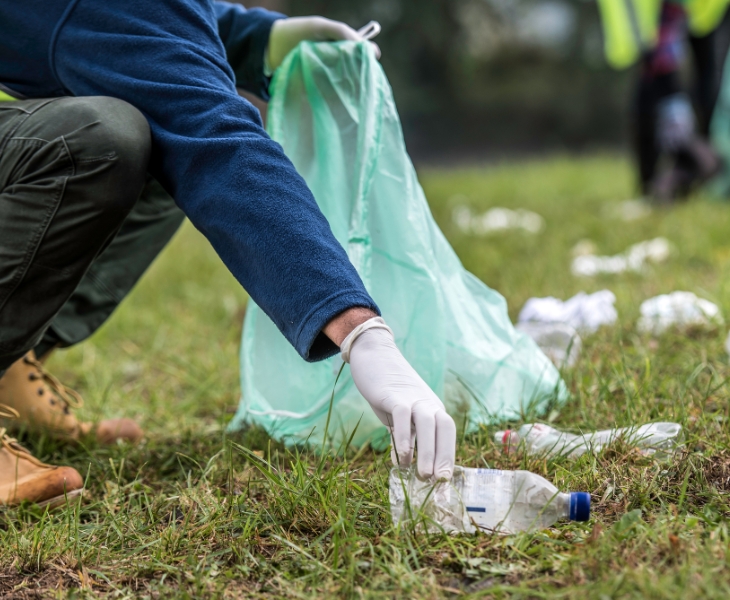This weekend, as every year, volunteers will turn out in droves across the nation for one impactful day to make a difference to their environment. Clean Up Australia Day began over thirty years ago, the inspiration of an avid Australian sailor, who was so appalled by the pollution and rubbish he encountered sailing the planet’s oceans, he organised a community event. Established in 1990 as Clean Up Australia Day, this has evolved as the nation’s largest community-based environmental event and an iconic day on the Australian calendar. There are also Clean Up Australia Day offshoots, including a dedicated Business and School Clean Up. It’s calculated more than 20 million Australians have taken practical environmental action and participated in Clean Up Australia activities and events, donating around 38.5 million hours of volunteer time and removing hundreds of thousands of Ute loads of rubbish from 215,500 registered locations nationwide. Last year, an estimated 934,433 Aussies registered for 12,474 Clean Up sites, donating around 1,868,886 hours of their time and effort!
Clean Up Australia
The Clean Up Australia organisation has emerged as one of the nation’s most recognised and trusted environmental charities, helping provide practical solutions to live more sustainably every day of the year. Their focus is as much on preventing rubbish entering our environment as it is removing what’s already accumulated. A Minderoo Foundation report confirms Australia generates the most single-use plastic waste in the world per capita, with the equivalent of 60kgs of waste for every Aussie per year. The government’s National Plastics Plan reveals we go through 70 billion pieces of soft plastics every year, that’s almost 3,000 pieces per person! And of course, COVID-19 brought on immense disruption to our lives – and environment. As Aussies battled through the global pandemic, there was an inevitable increase in single-use plastics, including environmental culprits face masks, coffee cups, food delivery packaging and takeaway utensils. There are massive challenges facing Australia’s recycling industry and while many States and Territories have now committed to – or plan to – ban key single-use plastic items, some, like disposable coffee cups have yet to be on the check list and others, including plastic bags, are hard to enforce.
Apart from what is clearly visible strewn across urban and nature areas, as if we needed further proof of our modern-day excesses, we should read Clean Up Australia’s Annual Rubbish Report. A snapshot of rubbish removed by volunteers during a calendar year, since 1991, this annual report has proven to be an invaluable resource in identifying trends in the types and spread of rubbish throughout this continent.
What a load of rubbish!
Based on 366,144 items counted from 1,075 surveyed locations across Australia over the last 12 months, Clean Up Australia’s 2022 National Rubbish Report reveals some alarming findings:
- Plastics account for 63 percent of rubbish items removed from parks, schools, bushland, creeks, beaches and roadways – a 17 percent increase from 2021.
- Notable increases compared to 2021, include soft plastics up by five percent, beverage containers up by four percent and hard plastics and polystyrene, up by five percent.
- Single-use plastics, including plastic bottles, takeaway containers, food packaging and lids, make up 25 percent of all reported rubbish.
- Plastic litter dominated all surveyed locations, with 79 percent found in school grounds, 74 percent in bushland and 60 percent in parks.
The top ten individual item rankings for 2022 as follows:
- Soft plastics, 17.5 percent
- Cigarette butts, 13.6 percent
- Single-use plastic bottles, 6.1 percent
- Fast food / takeaway containers, 6 percent
- Aluminium beverage cans, 6 percent
- Glass pieces, 5.1 percent
- Plastic packaging pieces, 1 percent
- Chips and confectionary wrappers, 3.7 percent
- Bottle caps and lids, 3.7 percent
- Face masks, 3.2 percent
Let’s reduce the rubbish before it needs to be removed!
The nation’s environmental challenges can’t possibly be solved in just one day. You can register with Clean Up Australia to organise your own efforts any day of the year, or armed with a garbage bag and gardening gloves, simply go it alone at your chosen neighbourhood and offending spot! Check out COSnet to stock up on some essentials like bin liners or gloves for doing your bit for the environment.
Perhaps we should all consider making a conscious effort to contribute less rubbish into our environment, avoiding what needs to be removed in the first place – helping the planet (and those hardworking volunteers) no end! The first steps to contributing less waste, improving our environment and greater sustainability simply takes some basic practices and habits that can easily be slotted into our daily lives – including your workplace. It’s easy for each of us to make a small difference – and encourage others to do so, too!!
- On your way to/from the office, get in the habit of using your own reusable coffee cup: Clean Up volunteers report that over 10 percent of rubbish they identify as paper are coffee cups, but they are in fact partly plastic lined – neither readily recyclable nor biodegradable.
- When packing your lunch for work or if you’re prone to grabbing takeaways or fast food during the day, bring your own reusable container – and better still, reusable cutlery.
- Maximise your use of provided recycle bins, not just at home but also at your workplace, especially in communal kitchens and dining areas. If there isn’t a recycling system in place, then why not initiate one yourself or encourage management to do so? Check out the Recycle Mate app if you’re confused about what goes in which coloured bin!
- On cigarette breaks, dispose of your butts responsibly; most workplaces usually provide a designated bin. They may be small, but butts are some of the planet’s most abundant form of plastic waste and each year, among the most reported litter item across Australia.
- If you’re involved in the procurement of office supplies, make sure you’re working with a sustainability conscious provider; eco-conscious multiple orders can end-up making a huge environmental difference.
We could list the ‘reduce, reuse, refuse, recycle and compost’ suggestions ‘till the cows come home, but for now, these make for an inspiring start and help ease our guilty conscious. Meantime, if you’ve missed your chance to join Clean Up Australia Day this year, there’s always 2024!

